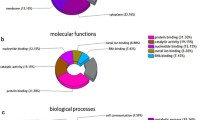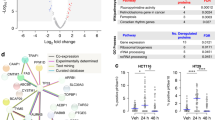Abstract
Purpose
This study aimed to explore the mechanism of multi-drug resistance (MDR) in 5-fluorouracil (5-FU)-induced breast cancer cell MCF-7.
Methods
MCF-7 cells were exposed in stepwise escalating concentration of 5-FU to develop the resistant cell line, MCF-7/5-FU. Biological and molecular characteristics of the cells were studied through MTT, flow cytometry, real-time PCR, western-blot, and the global protein profiles between MCF-7/5-FU and parental MCF-7 were compared using proteomic approach. Then some of the differentially expressed proteins were validated by western-blot. In addition, the role of 14-3-3σ was validated using gene transfection.
Results
Drug resistance of MCF-7/5-FU cells to 5-FU, MX, cDDP, ADM, TAXOL all increased significantly compared with MCF-7 cells and that maybe related to BCRP, but not MDR1 and MRP1. Differentially expressed proteins between MCF-7/5-FU and MCF-7 cells were identified; 12 proteins were up-regulated and 18 proteins were down-regulated in MCF-7/5-FU cells. Expressive levels of some proteins in western-blot validation were consistent with the results in proteomic analysis. Enforced 14-3-3σ expression can increase the sensitivity of MCF-7/5-FU cells to 5-FU and cDDP.
Conclusion
MDR of MCF-7/5-FU likely associated with differentially expressed proteins and 14-3-3σ may play a positive role in chemotherapy. These findings may provide theoretical support for the prediction of chemotherapeutic response and reverse of MDR.






Similar content being viewed by others
Abbreviations
- 5-FU:
-
5-Fluorouracil
- MX:
-
Mitoxantrone
- cDDP:
-
Cisplatin
- ADM:
-
Adramycin
- BCRP:
-
Breast cancer resistance protein
- MDR1:
-
P-glycoprotein
- MRP1:
-
Multidrug resistance-associated protein
- 2-DE:
-
Two-dimensional gel electrophoresis
- MALDI-TOF–MS:
-
Matrix-assisted laser desorption/ionization-time of flight mass spectrometry
- MDR:
-
Multi-drug resistance
References
Anderson JM, Heindl LM, Bauman PA, Ludi CW, Dalton WS, Cress AE (1996) Cytokeratin expression results in a drug-resistant phenotype to six different chemotherapeutic agents. Clin Cancer Res 2:97–105
Bakkenist CJ, Koreth J, Williams CS et al (1999) Heat shock cognate 70 mutations in sporadic breast carcinoma. Cancer Res 59:4219–4221
Bauman PA, Dalton WS, Anderson JM, Cress AE (1994) Expression of cytokeratin confers multiple drug resistance. Proc Natl Acad Sci USA 91:5311–5314
Borst P, Evers R, Kool M et al (2000) A family of drug transporters: the multidrug resistance-associated proteins. J Natl Cancer Inst 92:1295–1302
Candiano G, Bruschi M, Musante L et al (2004) Blue silver: a very sensitive colloidal Coomassie G-250 staining for proteome analysis. Electrophoresis 25:1327–1333
Caulin C, Ware CF, Magin TM, Oshima RG (2000) Keratin-dependent, epithelial resistance to tumor necrosis factor induced apoptosis. J Cell Biol 149:17–22
Chen JC, Chen Y, Su YH, Tseng SH (2007) Celecoxib increased expression of 14-3-3sigma and induced apoptosis of glioma cells. Anticancer Res 27(4B):2547–2554
Cullen JJ, Weydert C, Hinkhouse MM (2003) The role of manganese superoxide dismutase in the growth of pancreatic adenocarcinoma. Cancer Res 63:1297–1303
Dean M, Rzhetsky A, Allikmets R (2001) The human ATP-binding cassette (ABC) transporter superfamily. Genome Res 11:1156–1166
Dellambra E, Patrone M, Sparatore B et al (1995) Stratifin, a keratinocyte specific 14-3-3 protein, harbors a pleckstrin homology (PH) domain and enhances protein kinase C activity. J Cell Sci 108:3569–3579
Doyle LA, Yang W, Abruzzo LV et al (1998) A multidrug resistance transporter from human MCF-7 breast cancer cells. Proc Natl Acad Sci USA 95:15665–15670
Ferguson AT, Evron E, Umbricht CB et al (2000) High frequency of hypermethylation at the 14-3-3 σ locus leads to gene silencing in breast cancer. Proc Natl Acad Sci USA 97:6049–6054
Gilbert S, Loranger A, Daigle N, Marceau N (2001) Simple epithelium keratins 8 and 18 provide resistance to Fas-mediated apoptosis. The protection occurs through a receptor-targeting modulation. J Cell Biol 154:763–773
Gorg A, Obermaier C, Boguth G et al (2000) The current state of two-dimensional electrophoresis with immobilized pH gradients. Electrophoresis 21:1037–1053
Gottesman MM, Fojo T, Bates SE (2002) Multidrug resistance in cancer: role of ATP-dependent transporters. Nat Rev Cancer 2:48–58
Haimeur A, Conseil G, Deeley RG, Cole SP (2004) The MRP-related and BCRP/ABCG2 multidrug resistance proteins: biology, substrate specificity and regulation. Curr Drug Metab 5:21–53
He ZM, Yuan JH, Chen ZC (1998) Chemosensitivity test for 170 human breast carcinoma samples. Bull Hunan Med Univ 23:531–534
Hermeking H, Lengauer C, Polyak K et al (1997) 14-3-3 σ is a p53- regulated inhibitor of G2/M progression. Mol Cell 1:3–11
Hodge DR, Xiao W, Peng B (2005) Enforced expression of superoxide dismutase 2/manganese superoxide dismutase disrupts autocrine interleukin-6 stimulation in human multiple myeloma cells and enhances dexamethasone-induced apoptosis. Cancer Res 65:6255–6263
Jänicke RU, Sprengart ML, Wati MR, Porter AG (1998) Caspase-3 is required for DNA fragmentation and morphological changes associated with apoptosis. J Biol Chem 273:9357–9360
Kanzaki A, Toi M, Nakayama K et al (2001) Expression of multidrug resistance-related transporters in human breast carcinoma. Jpn J Cancer Res 1992:452–458
Kawasaki K, Watanabe M, Sakaguchi M et al (2009) REIC/Dkk-3 overexpression downregulates P-glycoprotein in multidrug-resistant MCF7/ADR cells and induces apoptosis in breast cancer. Cancer Gene Ther 16(1):65–72
Kim HK, Park WS, Kang SH (2007) Mitochondrial alterations in human gastric carcinoma cell line. Am J Physiol Cell Physiol 293:761–771
Leonard GD, Fojo T, Bates SE (2003) The role of ABC transporters in clinical practice. Oncologist 8:411–424
Leonessa F, Clarke R (2003) ATP binding cassette transporters and drug resistance in breast cancer. Endocr Relat Cancer 10:43–73
Liu R, Oberley TD, Oberley LW (1997) Transfection and expression of MnSOD cDNA decreases tumor malignancy of human oral squamous carcinoma SCC-25 cells. Hum Gene Ther 8:585–595
Lodygin D, Hermeking H (2005) The role of epigenetic inactivation of 14-3–3sigma in human cancer. Cell Res 15:237–246
Lodygin D, Hermeking H (2006) Epigenetic silencing of 14-3-3sigma in cancer. Semin Cancer Biol 16:214–224
Matsui H, Asou H, Inaba T (2007) Cytokines direct the regulation of Bim mRNA stability by heat-shock cognate protein 70. Mol Cell 25:99–112
Oguri T, Bessho Y, Achiwa H et al (2007) MRP8/ABCC11 directly confers resistance to 5-fluorouracil. Mol Cancer Ther 6(1):122–127
Ough M, Lewis A, Zhang Y et al (2004) Inhibition of cell growth by overexpression of manganese superoxide dismutase (MnSOD) in human pancreatic carcinoma. Free Radic Res 38:1223–1233
Park SJ, Wu CH, Safa AR (2004) A P-glycoprotein- and MRP1-independent doxorubicin-resistant variant of the MCF-7 breast cancer cell line with defects in caspase-6,-7,-8,-9 and -10 activation pathways. Anticancer Res 24(1):123–131
Parkin DM, Bray F, Ferlay J, Pisani P (2005) Global cancer statistics, 2002. CA Cancer J Clin 55:74–108
Pocaly M, Lagarde V, Etienne G et al (2008) Proteomic analysis of an imatinib-resistant K562 cell line highlights opposing roles of heat shock cognate 70 and heat shock 70 proteins in resistance. Proteomics 8:2394–2406
Pratt S, Shepard RL, Kandasamy RA et al (2005) The multidrug resistance protein 5 (ABCC5) confers resistance to 5-fluorouracil and transports its monophosphorylated metabolites. Mol Cancer Ther 4(5):855–863
Soini Y, Vakkala M, Kahlos K (2001) MnSOD expression is less frequent in tumour cells of invasive breast carcinomas than in in situ carcinomas or non-neoplastic breast epithelial cells. J Pathol 195:156–162
Srisomsap C, Sawangareetrakul P, Subhasitanont P et al (2004) Proteomic analysis of cholangiocarcinoma cell line. Proteomics 4:1135–1144
Suzuki H, Ueda T, Taguchi H (2007) Chaperone properties of mammalian mitochondrial translation elongation factor Tu. J Biol Chem 282(6):4076–4084
Szöke D, Györffy A, Surowiak P, Tulassay Z, Dietel M, Györffy B (2007) Identification of consensus genes and key regulatory elements in 5-fluorouracil resistance in gastric and colon cancer. Onkologie 30(8–9):421–426
Van Hemert MJ, Steensma HY, van Heusden GP (2001) 14-3-3 proteins: key regulators of cell division, signalling and apoptosis. Bioessays 23:936–946
Vargas-Roig LM, Gago FE, Tello O et al (1998) Heat shock protein expression and drug resistance in breast cancer patients treated with induction chemotherapy. Int J Cancer 79(5):468–475
Weydert C, Roling B, Liu J et al (2003) Suppression of the malignant phenotype in human pancreatic cancer cells by the overexpression of manganese superoxide dismutase. Mol Cancer Ther 2:361–369
Willipinski-Stapelfeldt B, Riethdorf S, Assmann V et al (2005) Changes in cytoskeletal protein composition indicative of an epithelial-mesenchymal transition in human micrometastatic and primary breast carcinoma cells. Clin Cancer Res 11:8006–8014
Yang YX, Xiao ZQ, Chen ZC et al (2006) Proteome analysis of multidrug resistance in vincristine-resistant human gastric cancer cell line SGC7901/VCR. Proteomics 6:2009–2021
Yuan J, Lv H, Peng B, Wang C, Yu Y, He Z (2009) Role of BCRP as a biomarker for predicting resistance to 5-fuorouracil in breast cancer. Cancer Chemother Pharmacol 63(6):1103–1110
Zhang N, Yin Y, Xu SJ, Chen WS (2008) 5-Fluorouracil: mechanisms of resistance and reversal strategies. Molecules 13:1551–1569
Zhong W, Oberley LW, Oberley TD et al (1997) Suppression of the malignant phenotype of human glioma cells by overexpression of manganese superoxide dismutase. Oncogene 14:481–490
Author information
Authors and Affiliations
Corresponding author
Additional information
G. Zheng and F. Peng contributed equally to this work.
Rights and permissions
About this article
Cite this article
Zheng, G., Peng, F., Ding, R. et al. Identification of proteins responsible for the multiple drug resistance in 5-fluorouracil-induced breast cancer cell using proteomics analysis. J Cancer Res Clin Oncol 136, 1477–1488 (2010). https://doi.org/10.1007/s00432-010-0805-z
Received:
Accepted:
Published:
Issue Date:
DOI: https://doi.org/10.1007/s00432-010-0805-z




